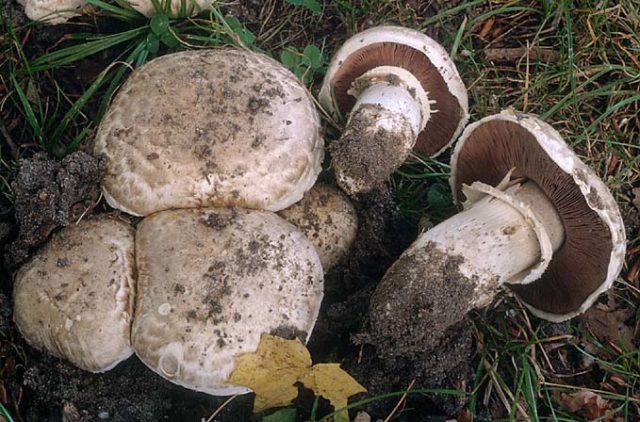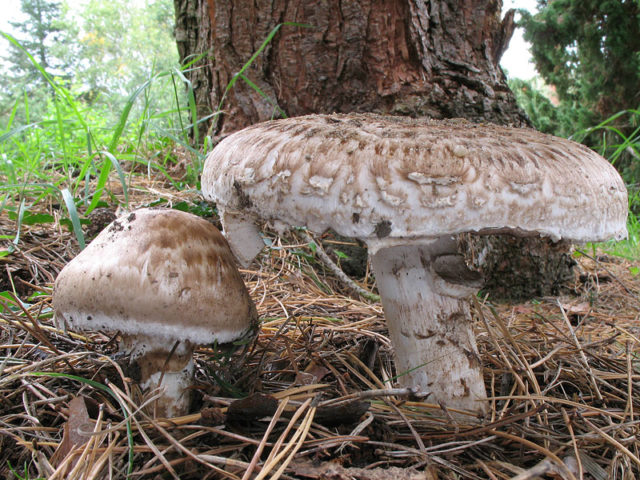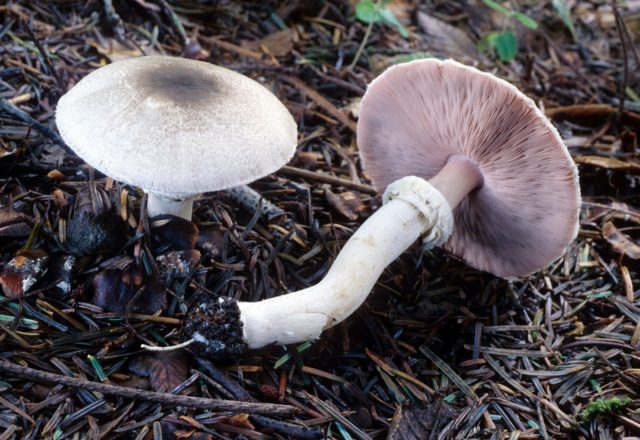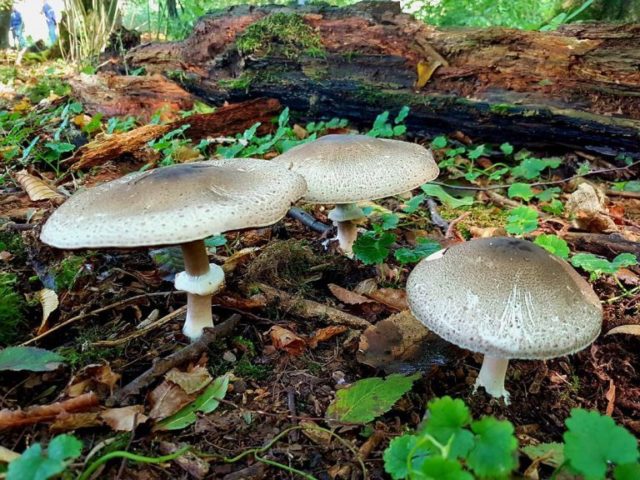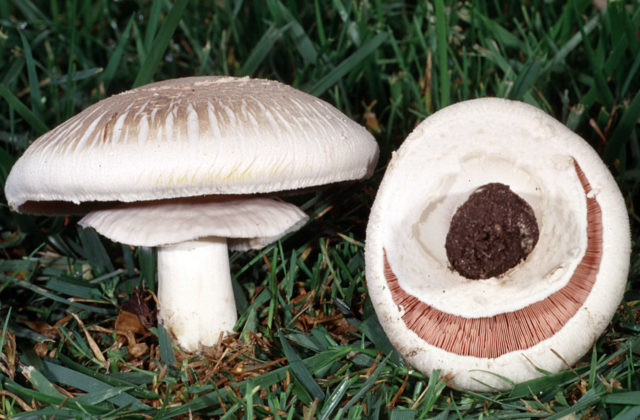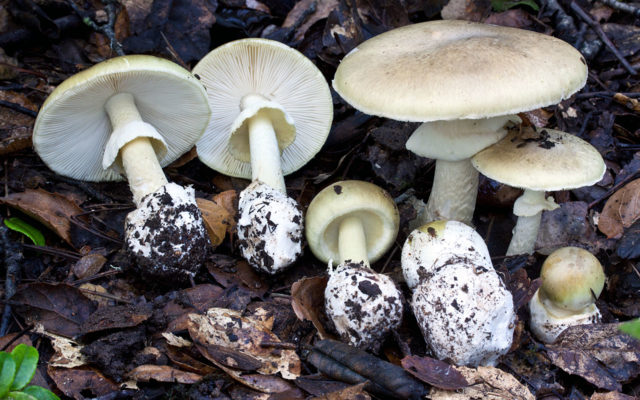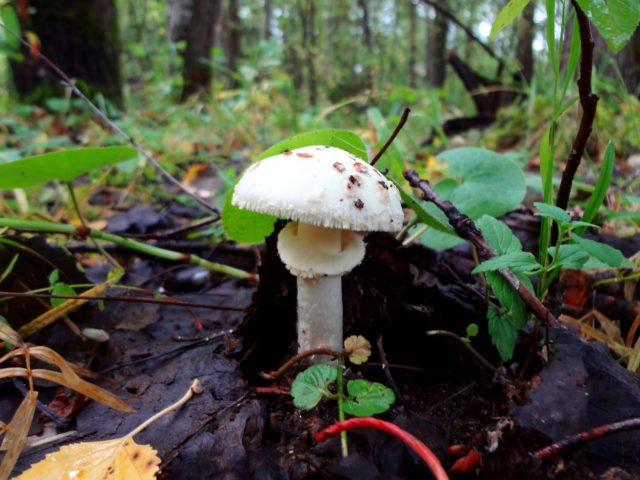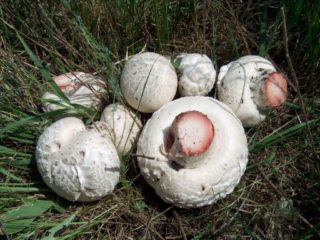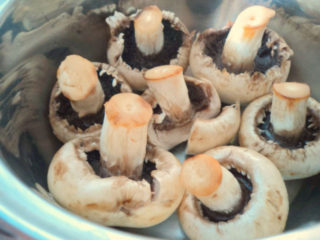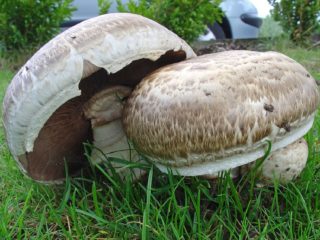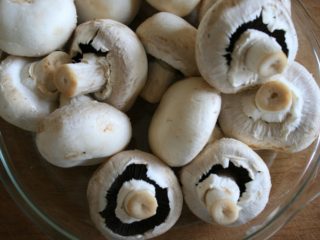Content
Greenhouse or steam champignons (Agaricus cappellianus) belong to the genus of lamellar mushrooms. They are quite popular among Russians due to their excellent taste, aroma and widespread use in cooking for the preparation of various dishes.
What does greenhouse champignon look like?
Greenhouse mushrooms have a red-brown cap with infrequent scales. Its diameter varies depending on age - 3-10 cm. There are remains of a bedspread at the edges. There is a thick sagging ring in one row around the cap.
Legs are white, go deep into the substrate. They are smooth, of almost the same thickness along their entire length. There is a small depression only at the base. The height of the legs is within 10 cm. At first, fibers are visible on them, then the surface is smoothed out.
Greenhouse champignon - edible mushroom, belongs to the third category. Differs in fragrant pulp (smells like chicory) of white color with a subtle mushroom aroma. If it is damaged or cut, then reddishness appears. The plates are located under the head. While the mushroom is young, they are reddish pink. Their surface turns brown with age.
The spores of the fruiting body are chocolate-colored, the same color is inherent in the spore powder.
Where does the steamed champignon grow?
Greenhouse or fallow champignon prefers mixed forests, meadows, pastures and gardens. In a word, the soil is rich in humus. After all, forest fruits are inherently saprophytes. They can be specially grown in greenhouses. Fruiting begins at the end of June and continues in July.
If we talk about territorial pretensions, then greenhouse mushrooms can be found in almost all regions of Russia, except for the north.
Is it possible to eat greenhouse champignon
Greenhouse champignons are mushrooms of the third category of edibility. They have a peculiar taste, a pleasant mushroom aroma with a chicory flavor. The culinary uses are varied. Hats and legs can be fried, stewed, boiled, salted and pickled.
Heat treatment for greenhouse mushrooms is not contraindicated, it does not change the appearance and taste of fruit bodies. Each housewife, depending on her culinary capabilities, can prepare many delicious dishes.
False doubles
Greenhouse champignons, due to their special aroma, cannot be confused with other members of the family. Among the huge number of mushrooms there are false ones, the pulp of which is filled with poison. They are hazardous to health. Sometimes even experienced mushroom pickers cannot distinguish edible from inedible.
To do this, you need to know some features in order to distinguish:
- poisonous champignon;
- pale toadstool;
- light fly agaric;
- champignon is variegated and yellow-skinned.
All these mushrooms are inedible, toxic, hazardous to health.
Mushroom flat-lipped
This representative of the family has a well-marked brown spot on the cap at the very top of the head. When pressed, it turns light yellow. The entire surface is covered with scales.
But this is not enough, there are still signs that will help you pick the right mushrooms:
- False champignons, in contrast to edible representatives, smell disgusting, it is worth breaking them. Few people will find the smell of carbolic acid, chemistry or pharmacy pleasant.
- At the break, the pulp turns yellow.
- When the false doubles are placed in hot water, they momentarily turn bright yellow.
This species appears closer to autumn, often grows next to human habitation. The mushroom is poisonous, symptoms of poisoning become noticeable 1-2 hours after eating.
Motley champignon
This member of the family has a long, thin leg, which becomes dark with age. The mushroom smells sour, and a brown spot appears on the cut. The species is poisonous.
Yellow-skinned champignon
This mushroom is also toxic. You can distinguish it by the absence of scales on the cap and the double ring on the leg.
Death cap
This poisonous mushroom looks like a greenhouse champignon. In order not to be mistaken, you need to know the differences:
- The pulp of a pale toadstool has no characteristic mushroom smell at all.
- The poisonous double has sacs at the roots, you need to pay attention to them.
- The pulp on the break, as well as during cooking, turns yellow.
- Young greenhouse toadstools are especially similar to champignons. In the future, it is difficult to confuse them, since scales disappear on the cap, and the fringe sags.
White fly agaric
Only an inexperienced mushroom picker can put the fly agaric in the basket. But a sharp, unpleasant stench should stop him. White fly agarics cannot be eaten, since it is difficult to save a person after poisoning.
Collection rules and use
Collect greenhouse mushrooms carefully so as not to damage the mycelium. It is best to use a sharp knife for cutting. But if it is not at hand, you can unscrew the leg from the ground.
The collected fruit bodies must be poured with cold water and soaked for four hours, placing them with plates down. During this time, all grains of sand will sink to the bottom. It remains to rinse each mushroom in two more waters, and then use it at your discretion.
Conclusion
Greenhouse or steam mushrooms are excellent raw materials for preparing various dishes and preparations for the winter. In cold weather, you can use salted, dried, pickled fruits for salads, soups, which households will gladly eat.
